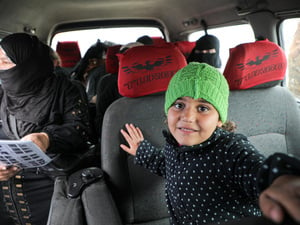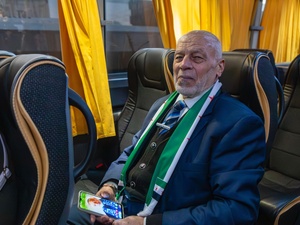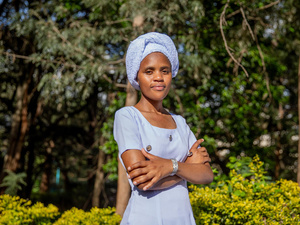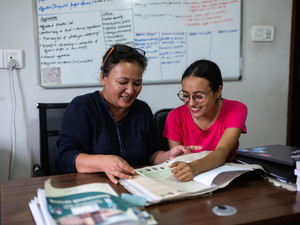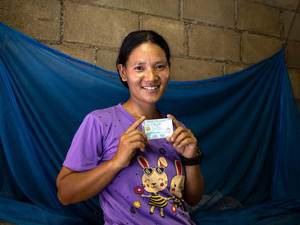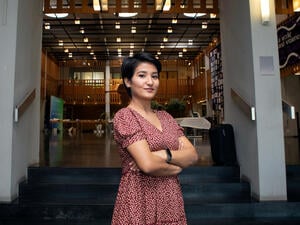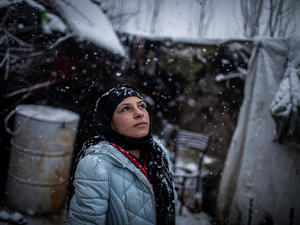Born in exile, Syrian children face threat of statelessness
Born in exile, Syrian children face threat of statelessness

A young Syrian mother crosses the border into Jordan with her month-old son. Syrian children born in exile are particularly vulnerable to statelessness.
AMMAN, Jordan, November 4 (UNHCR) - Amid the tragedy of Syrian children born into exile, another, largely hidden catastrophe is unfolding. Undocumented and with no proof of their nationality, many Syrian refugee children face a dangerous and uncertain future due to the risk of statelessness.
Statelessness is a problem that affects at least 10 million people worldwide. Stateless individuals are often unable to obtain identity documents and suffer severe restrictions on their rights and freedom of movement.
Unregistered children are especially at risk of becoming stateless, as without birth certificates they lack a key means of proving their nationality. They may also be denied access to health care and education, and face an increased risk of exploitation, such as trafficking for commercial sex work, illegal adoption, or child labour.
UNHCR Director of International Protection Volker Türk said that many Syrian refugee children had not been able to acquire documentation which proved they were Syrian nationals. "Unless this can be resolved at a later date, these children may be left stateless," he noted.
In a bid to address this and other problems related to statelessness, UNHCR is today launching a global campaign aimed at ending statelessness within 10 years. Together with a special report on the issue, the campaign features a 10-point global action plan to end statelessness, which seeks both to resolve existing crises and to ensure no child is born stateless in the future.
Since the start of the Syrian conflict in 2011, more than 50,000 Syrian children have been born in exile in neighbouring countries. Under Syrian law, nationality can only be passed to a child by the father. In the midst of a war that has robbed hundreds of thousands of Syrian children of their fathers, this has dramatically increased the risk of statelessness.
Rasha* gave birth to her twin girls in Jordan, after fleeing from Syria alone and pregnant. Her husband Sayid was arrested in Syria after refusing compulsory military service, and she has heard no word of him since.
"It wasn't safe for me to stay after that - I left immediately, without any papers," she told UNHCR. "Now my daughters can't get birth certificates, because I don't have my marriage papers and I don't have a husband next to me either. I have no way to prove my girls are Syrian, and I can't give them my nationality on my own."
Even when the father is present, in most refugee host countries it is only possible for parents to register a birth with an official marriage certificate. But many who fled Syria were forced to leave everything behind, or report that their documents were lost or destroyed during flight.
As a result, a UNHCR survey indicates that 70 per cent of Syrian children born in Lebanon are without an official birth certificate - a situation thought to be broadly reflected throughout the region.
Unable to legally obtain a birth certificate in their host country, some refugees have taken huge risks to try to resolve the situation. Some mothers report smuggling their newborns back across the border into Syria in order to register them as if they had been born there. Others say their husbands or other family members returned to Syria to try to get the documents needed to register the birth, sometimes never to return.
To try to address the issue, UNHCR and its partners have distributed more than 250,000 leaflets on birth registration procedures, and animated films on the subject are shown to thousands of refugees each day at registration and community centres across the region.
"UNHCR is also working in partnership with governments and refugee communities to address the situation," Türk adds. "Legal aid initiatives have been established in Lebanon, Jordan and Iraq to help refugee families complete the procedure if they encounter difficulties, with 3,000 refugee families counselled each month on birth registration in Lebanon alone."
Host countries are also adopting a flexible approach to registering refugee births in their territory. The Jordanian authorities have established civil registry departments and courts inside the country's two main refugee camps, Za'atari and Azraq, to help Syrian refugees who would otherwise struggle to access government offices in the cities.
The ultimate goal is to ensure the registration of every Syrian child born in exile, in order to safeguard their rights and protection as refugees and, once conditions inside Syria allow it, to lay the foundations for their safe return home.
* Name changed for protection purposes
By Amit Sen and Charlie Dunmore in Amman, Jordan and Ana Pollard in Beirut, Lebanon


